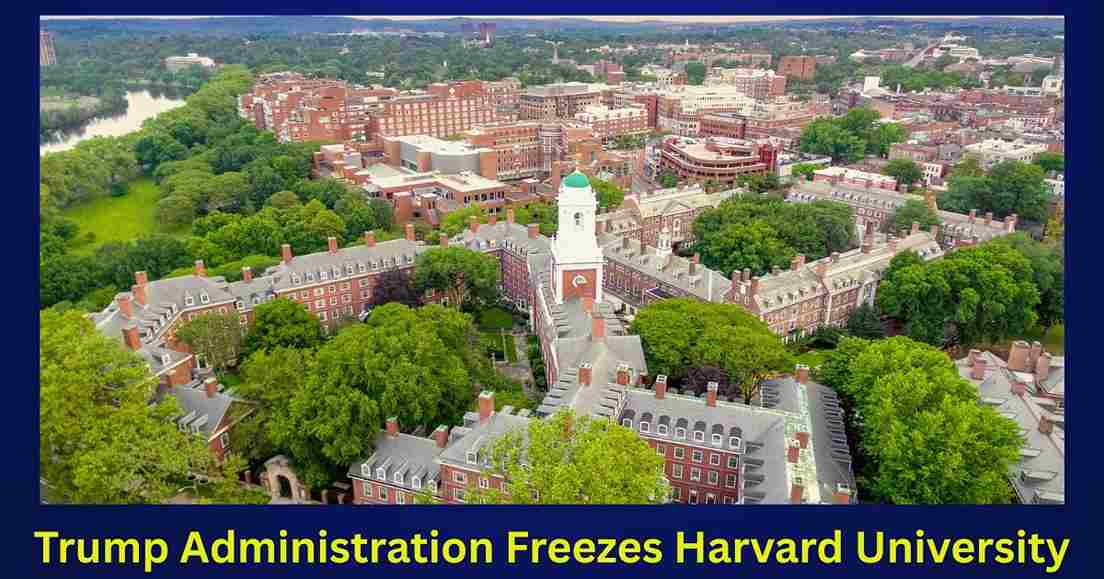Trump Administration Freezes $2.2 Billion Funding to Harvard University in Massachusetts Over Antisemitism Dispute

The Trump administration has taken a bold and controversial step by freezing over $2.2 billion in multi-year grants and contracts to Harvard University in Massachusetts. The move, confirmed by the administration’s Joint Task Force to Combat Antisemitism, comes amid growing tensions between the federal government and some of the country’s top universities over how they are handling rising incidents of antisemitism on campus.
To Join Us On WhatsApp Click Here
Background of the Decision
The decision follows a statement from Harvard University President Alan M. Garber, who declared that the university would not comply with certain federal demands aimed at curbing antisemitic activity on campus. According to the administration, these demands were issued to ensure that universities uphold civil rights laws and protect Jewish students from harassment and discrimination.
Garber stated in his letter that Harvard had been presented with an “updated and expanded list of demands” late on a Friday night. These demands were tied to maintaining the university’s financial relationship with the federal government. Garber criticized the nature of these conditions, arguing that they went beyond addressing antisemitism and amounted to direct interference in the intellectual and academic freedom of the institution.
“We have informed the administration through our legal counsel that we will not accept their proposed agreement. The University will not surrender its independence or relinquish its constitutional rights,” Garber said in a strong response.
Statement from the Joint Task Force
In its announcement, the Joint Task Force to Combat Antisemitism said the freeze includes $2.2 billion in grants and $60 million in contracts allocated to Harvard. The task force stressed that federal investment in education comes with a responsibility to uphold civil rights laws and ensure campuses remain safe and inclusive for all students.
“Harvard’s statement today reinforces the troubling entitlement mindset that is endemic in our nation’s most prestigious universities,” the task force said. “The harassment of Jewish students is intolerable. The disruption of learning that has plagued campuses in recent years is unacceptable.”
The statement further warned that universities unwilling to take meaningful steps to combat antisemitism risk losing federal taxpayer support.
Broader Crackdown on Ivy League Schools
This funding freeze is part of a wider federal investigation into antisemitism on college campuses, particularly following pro-Palestinian protests that have intensified since October 2023. President Trump’s administration has launched a probe into multiple Ivy League institutions, suspending federal funding for all Ivy League schools except the University of Pennsylvania and Dartmouth College.
A recent review by the federal task force also revealed that Harvard holds nearly $9 billion in federal grants and contracts — funding now at risk if the university continues to oppose the administration’s terms.
Impact and Implications
The move has ignited a national debate on the balance between academic independence and government oversight. Critics of the Trump administration argue that the freeze sets a dangerous precedent by pressuring universities to align with political expectations or face financial consequences. Others, however, have applauded the administration for taking decisive action to address rising antisemitism and protect Jewish students.
The administration has also announced plans to detain and deport foreign students who were involved in organizing anti-Israel protests. Officials say such measures are necessary to curb extremism and restore safe learning environments.
Conclusion
The freezing of Harvard’s federal funding marks a significant and controversial moment in the ongoing clash between university autonomy and government mandates. As the situation unfolds, the outcome could reshape how American universities respond to civil rights issues, manage campus protests, and maintain federal relationships in a politically charged climate. Whether Harvard will eventually compromise or stand firm on its principles remains to be seen — but the stakes, both financially and politically, are undeniably high.
Certainly! Here’s a more detailed introduction about Harvard University that you can use in articles or reports:
Harvard University
Harvard University, located in Cambridge, Massachusetts, is one of the most prestigious and oldest institutions of higher education in the world. It was established in 1636 by the Massachusetts Bay Colony and named after its first benefactor, John Harvard. As the oldest university in the United States, Harvard has a long-standing reputation for academic excellence, influential research, and leadership in education.
The university is part of the Ivy League and comprises 13 schools and institutes, including the well-known Harvard College (for undergraduate studies), Harvard Law School, Harvard Medical School, Harvard Business School, the Harvard Kennedy School, and the Harvard Graduate School of Education, among others.
Harvard has a diverse student body, with thousands of students from all 50 U.S. states and more than 100 countries. It offers undergraduate, graduate, and professional programs in a wide range of fields including science, engineering, medicine, law, business, arts, and humanities.
The university’s sprawling library system is the largest academic library in the world, housing over 20 million volumes. Harvard is also known for its strong emphasis on research and innovation, and it has consistently been ranked among the top universities globally.
With a massive endowment — one of the largest of any educational institution in the world — Harvard supports extensive academic research, student scholarships, and global initiatives. The university’s alumni network includes U.S. presidents, Nobel laureates, world leaders, tech innovators, and leading figures in literature, science, and business.
Harvard’s main campus lies along the Charles River in Cambridge, but the university also has facilities and affiliated institutions in nearby Boston, such as the Harvard Medical School and affiliated hospitals.
Despite its elite status, Harvard continues to work on issues of accessibility, inclusion, and academic freedom — often placing it at the centre of national and international discussions on education, ethics, and public policy.
You Might Also Like:
Cyber Police Kashmir Cracks Down on 50 Mule Accounts Linked to Online Fraud
J&K Students Association Thanks Dr. S. Jaishankar for Rescuing Trafficked Kashmiri Youth
Omar Abdullah Slams Waqf Amendment Act 2025, Calls It Discriminatory and Unconstitutional





